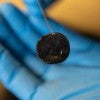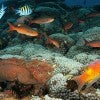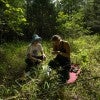
STAT’s Hopkins co-authors National Academies report. CAREER Awards keep coming. DOE funds NEWT desalination research.

STAT’s Hopkins co-authors National Academies report. CAREER Awards keep coming. DOE funds NEWT desalination research.

Kory Evans wins NSF CAREER Award
Kory Evans, an assistant professor of biosciences at Rice University, has won a prestigious National Science Foundation CAREER Award to study shape change in the skull of spiny ray-fin fishes across their evolutionary history.

New fluorescent dye can light up the brain
Rice chemist Han Xiao and Stanford researcher Zhen Cheng have developed a tool for noninvasive brain imaging that can help illuminate hard-to-access structures and processes. Their small-molecule dye is the first of its kind that can cross the blood-brain barrier, allowing researchers to differentiate between healthy brain tissue and a glioblastoma tumor in mice.

DNA repair scheme gets closer look for cancer therapy
Rice bioscientists took a close look at one of the ways cells repair broken DNA and made a discovery about a promising target for cancer therapy.

Pathogenic sensor’s surprising capabilities revealed
Rice synthetic biologists have uncovered new capabilities of a genetically encoded sensor that allows salmonella, E. coli and other pathogens to sicken millions of people each year.

Tropical wildlife follow the same daily patterns worldwide
A massive study of rainforest species across three regions of the world finds striking similarities in how animals spend their days.

Strategic planning process to be launched in January
President Reginald DesRoches shared the news with the Rice community in an email Nov. 21.

Rice facility is ‘one-stop shop’ for customizing DNA to fight cancer
Rice bioengineers, synthetic biologists and cancer researchers celebrated the opening of Rice’s first CPRIT Core Facility, the Genetic Design and Engineering Center, or GDEC, Nov. 10 at the BRC.

Bacterial sensors send a jolt of electricity when triggered
Rice researchers develop programmable bacteria that sense contaminants and release an electronic signal in real time.

NSF backs bid to speed environmental tests for viruses
The NSF backs Rice University efforts to speed the analysis of wastewater for coronaviruses from hours to seconds.

Climate risks for Gulf of Mexico coral reefs spelled out in study
Promptly reducing greenhouse emissions would give Gulf of Mexico corals up to 20 extra years to adapt to critical threshold temperatures, according to Rice research.

See nature like (and with) a biologist in new online courses
Online learners can follow Rice biologist and author Scott Solomon into the wild through an engaging series of courses focused on ecology, evolution and biodiversity.

Rice lab grows macroscale, modular materials from bacteria
Rice bioscientists have created bacteria that self-assembles into a material like putty that could soak up pollutants.

Onuchic wins top Biophysical Society honor
José Onuchic wins the 2023 Founders Award presented by the Biophysical Society.

Can fungi help Texas’ grasses cope with climate change?
Rice biologists are using Texas as a living lab to study how symbiotic fungi help grasses tolerate drought.